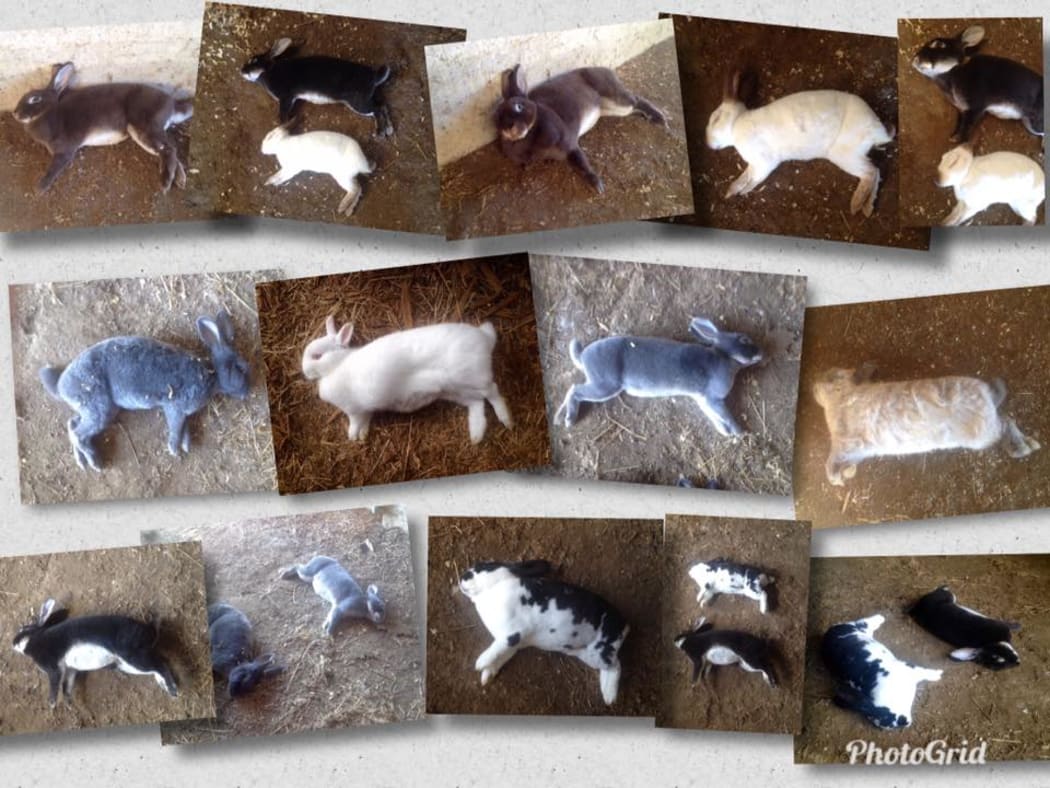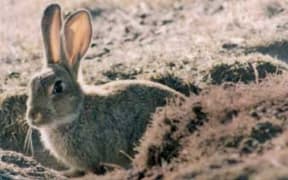Owners of pet rabbits are fearing for the safety of their animals after revelations a new strain of the calicivirus has been in the country much longer than first thought.

Rabbits that have died from RHVD2 Photo: Supplied
Inquiries by RNZ News have revealed the RHDV2 strain, originally thought to have been in Marlborough since May, has in fact been present since at least December last year in Bay of Plenty.
After noticing some of her animals had started falling ill in January, Rotorua rabbit breeder Joanne McMillan quickly had it confirmed by a vet the rabbits she had spent years breeding for competition had calicivirus.
What followed was a month of rabbits falling ill and quickly dying.
"It was just awful, It's probably the worst thing that any rabbit owner can go through."
Twice a day she would do what she described as her death walk, pulling rabbits that showed signs of being unwell from their cages.
Ms McMillan had never seen anything like it and wondered why the disease was even killing rabbits that had been vaccinated against calicivirus.
Of the 16 that died, half had received their jabs.
"There was nothing I could do. I was doing everything possible. And you don't know who's going to die, because it's invisible. I had one rabbit die in a cage of four, none of the others died [it's] just random and it's so heartbreaking."
Ms McMillan now suspects her rabbits may have fallen victim to the RHDV2 strain.
The Ministry for Primary Industries (MPI) has confirmed the strain's been in Bay of Plenty since at least December last year.
Her outbreak happened in January, just a month later.
She called MPI then to have her rabbits tested but had yet to hear back from them.
MPI's response manager John Brightwell, did not have any information about her case.
But he said the Bay of Plenty discovery had changed everything.
"The new discoveries in the Bay of Plenty does make it unlikely that we'll be able to eradicate now it's been found on two islands. It also makes it unlikely that we'll be able to contain this disease."
A vaccine was made available to worried owners of pet rabbits and to rabbit farmers on 14 June.
The strain is thought to have made its way here from Europe or Canada, either inadvertently or on purpose.
The original calicivirus was introduced by farmers wanting to control the spread of rabbits and Mr Brightwell said this possibility could not be discounted.
He said MPI was taking the incursion seriously and had two people dedicated to tracing its spread and working out how it got here.
"The resource requirements of this response fluctuates depending on information that is coming through and ... from the data coming through we make an assessment and then we follow up where we need to."
A Landcare Research scientist working on rabbit bio-control, Janine Duckworth, said there was a lot that was still not known about the new strain.
"Biosecurity incursions are something we want to avoid because we don't want unwanted viruses coming in. This time it may have been RHDV2 but it could have been something far more serious."
Ms Duckworth said the virus was spread by flies and the lack of flies through the winter months would restrict how far it travelled.
She said a better picture of how widespread it was would not be available until the weather started to warm up.



